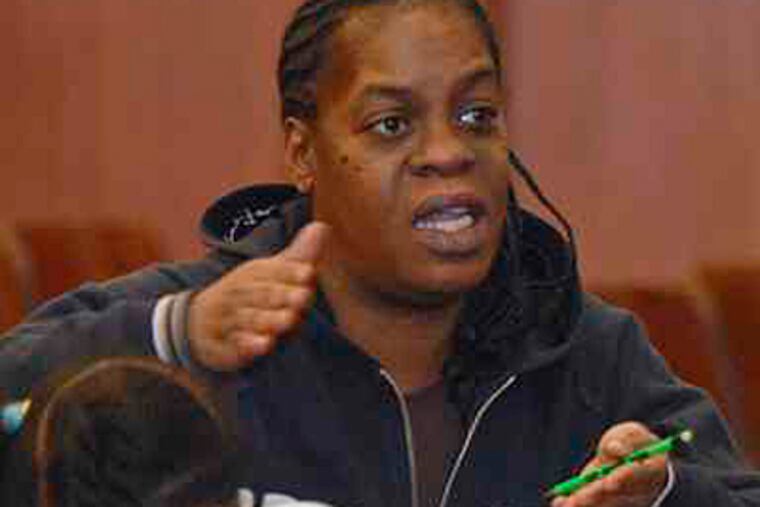Parents implore district: Stop tinkering, fix schools
Parents at one North Philadelphia school that may be radically overhauled in the fall had a clear message for the Philadelphia School District last night: Enough is enough. Stop tinkering with our school and figure out how to help our kids.

Parents at one North Philadelphia school that may be radically overhauled in the fall had a clear message for the Philadelphia School District last night: Enough is enough. Stop tinkering with our school and figure out how to help our kids.
Winifere Thornton said she wasn't sure about the announcement that, by landing in the bottom 10 percent of schools districtwide, Dunbar might be operated as a charter, or by outside management. It might remain under district control, but with big changes in staff and school day.
If chosen as a "Renaissance" school, Dunbar, on 12th Street near Temple University, would be on its third manager in eight years. Parents and students feel whipsawed by all the upheaval, Thornton said.
"Too many changes," Thornton said. "Everything failed. Different principals all the time."
Her grandson, she said, is in sixth grade but reads at a third- or fourth-grade level. Several parents in attendance said their children were also behind.
Nikia Denby, one of the 30 parents and teachers in attendance last night, went to Dunbar when it was a good school, she said, and now she's the parent of three children there.
She's undecided about Renaissance schools, but she knows she wants something better for her children.
"Why pass kids along when they don't know the curriculum? They're moving, but their brains aren't moving with them," Denby said. "When it's time for my son to compete in the real world, he will struggle."
Dunbar doesn't have enough opportunities, she said.
"I want to see what it's about," Denby said of the proposed overhaul. "But if being a Renaissance school would help our kids, then maybe it's a good thing."
Lisa Gass, who has children at the school and runs a camp attended by many Dunbar pupils, was skeptical. She doesn't like the idea of a new staff coming in - the learning curve might be too steep, she said.
"It's a constant change, and it deters from children trying to stay focused," Gass said.
Dunbar was one of the schools chosen in 2002 to be run by an outside provider, the district's first try at turning schools over to private managers. That experiment was widely considered a failure.
Temple University ran Dunbar for a time. There were problems, said Bunmi Samuel, a North Philadelphia community organizer.
"Temple had a free-for-all," Samuel said. "No one asked them questions."
District officials told the parents last night that the mistakes of the first wave of privatization would not be repeated. This stab at turnover will have community input and clear standards for providers.
Providers will sign five-year contracts to run Renaissance schools, but if they're not meeting standards, they will be thrown out, said Tomas Hanna, Superintendent Arlene Ackerman's chief of staff.
Parents with children at the affected schools will be asked to lead school advisory councils that will help select the providers eventually chosen to run their schools.
"In all my years at the district, I don't recall a home and school association or a school council having that kind of decision-making power," Hanna said.
Parent Lester Johnson said he might be interested in sitting on the advisory council.
His two older children, now at Masterman and Central, went through Dunbar. His youngest is now in second grade, and the school has dropped off, Johnson said.
"In this school, their biggest problem is they don't have control," Johnson said. "And you're lucky if you get 10 parents to come out to anything."
He thinks the school needs higher standards for students. And though he's cautious, he's willing to think about one more big structural shift.
"If it's going to be better for the school, yes, I'm for change," Johnson said.
A similar meeting was also held last night at Daroff Elementary in West Philadelphia; about 75 attended that session.
Principal Bonnie Berman said that becoming a Renaissance school could be good for Daroff.
But, she said, parents were wary.
"They're a little skeptical that this was untried," Berman said. "Wholesale change is hard."
Tonight and through next week, the district will hold teacher and community meetings at each of the 14 schools on the Renaissance-eligible list. On March 12, the final list of Renaissance schools will be announced.
Roslyn Campbell, a former district teacher, is eager to hear more at the meeting tomorrow night at the Smedley School in Frankford, where her grandson is in fifth grade.
A radically restructured school "beats what's going on there now," said Campbell. "I'm all for the change."
Her grandson is just learning cursive writing, she said. She worries that his math curriculum is too basic, and she fears for his safety at the school.
Saturday school? Longer days? Charter school or outside provider? Fine, Campbell said.
"The longer the kids are in school, the less trouble they're in, the less they're on the street," she said. "As long as the education value is better than what it is now, I'm for anything."